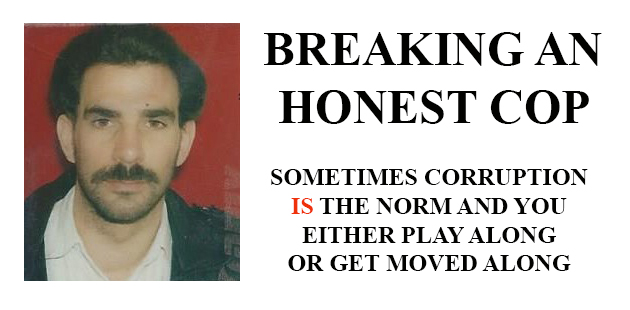Police Work: The breaking of an honest cop Chapter 4
The Loudoun County Commonwealth Attorney’s Office had come under scrutiny in the past for withholding exculpatory evidence in other cases.
The chief investigator in the Carter case, that wasn’t the first mess he was involved with. He was singled out in the past by the local court for his questionable investigative techniques. In fact in 1987 in the case of Commonwealth v Tickel, the Loudoun County Circuit Court suppressed several items of evidence seized by this investigator, resulting in the dismissal of five felony charges.
Of the remaining three felony charges that went to trial, Tickel was found not guilty of one charge but guilty of the remaining two.
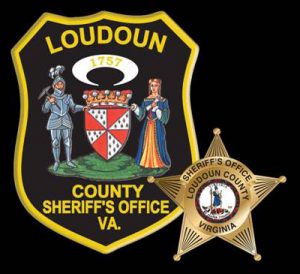 When the Court of Appeals took a look at the case, it overturned the conviction because a key piece of evidence used to secure Tickel’s conviction had been “altered” while in the possession of either the commonwealth’s attorney’s office or the sheriff’s department. It wasn’t clear who had altered it.
When the Court of Appeals took a look at the case, it overturned the conviction because a key piece of evidence used to secure Tickel’s conviction had been “altered” while in the possession of either the commonwealth’s attorney’s office or the sheriff’s department. It wasn’t clear who had altered it.
By the way, following the Tickel case, what do you think happened to that investigator? The sheriff promoted him. He was now going to supervise other investigators.
Burch and his team told the papers they weren’t going to prosecute any of my cases. Why?
Burch was still handling cases. Beamer was still doing his job. But they had to further discredit my reputation by not working with me and then telling that to the newspapers. They orchestrated a smear campaign against me just to protect their own ass.
William Burch told the press, “He’s relating a conversation that did not occur. When we call a witness to the stand, we are vouching for his credibility.”
The conversation did occur and there was nothing wrong with my credibility, although I didn’t have the power and the influence with the press that he had.
Loudoun County Assistant Commonwealth’s Attorney, James Forsythe told the Leesburg Today newspaper in December 1991 that “He [Poppa] testified at the hearing that something happened that did not happen. At this point, we cannot put him on the witness stand.”
How the hell did Forsythe know that Burch wasn’t lying and that I was? Why was he acting like a parrot by echoing the lies Burch was saying?
Because he talked to his friend and boss, Burch, and Burch said I was lying and not he, so he took that at face value and makes this statement to the press?
Had Burch taken a polygraph that nobody knew about? No, it was just the good-old-boys sticking together.
What Burch and his ignorant sidekick had just told the papers was that I testified to something that did not happen. That’s perjury!
The attorney general’s office, the commonwealth attorney’s office, the state police, and the sheriff’s office were not interested in finding out who was lying.
Why? Because they knew I was telling the truth and that it would lead back to Burch, Beamer and Carole Carter, then they would have a problem with the Carter case.
There was simply no other explanation for it.
Now get this: According to them I had no credibility and perjured myself in Loudoun County Court. So what do they end up doing?
They had a special prosecutor from another jurisdiction handle my pending criminal cases and I testified in the same Loudoun County Circuit Court several times and got convictions on my cases.
To them, I was a perjurer, but it was okay for me to still testify in court as long as they weren’t the ones handling the cases.
Would any competent prosecutor allow someone to take the stand and testify in any case, if he actually believed they were lying as Burch did? Wouldn’t that be malfeasance and misfeasance on Burch’s part? But that is exactly what William Burch did.
I was the one who asked to be put on a polygraph along with Burch and Beamer. However, Loudoun County Commonwealth’s Attorney, William Burch and Sheriff’s Captain, Vernon Beamer never made a similar request, not once, not at any time.
I could ask why but that would be a pretty stupid question.
This really happened. What rock did these people crawl out of, I was thinking at the time? But it gets even better.
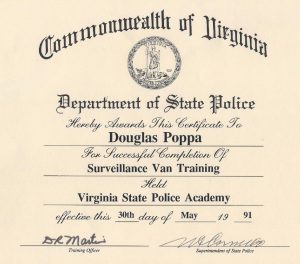 I had an ally on my side in a trial I was testifying in — an ally that counted.
I had an ally on my side in a trial I was testifying in — an ally that counted.
In the trial, the defense attorney attempted to discredit me because of what was going on and Loudoun County Circuit Court Judge, James Chamblin told the attorney, “There are two sides to every story.”
“Doug Poppa hasn’t been convicted of doing anything wrong.”
The defense attorney did not pursue the matter. The drug dealer was sentenced to prison.
When the state police investigator interviewed me, he had no interest in trying to get to the truth. He thought I had just made the whole thing up, even after I told him that there were witnesses from four years ago who could support what I had testified to; a now-former lieutenant with the sheriff’s department, a Federal Probation Officer and a Special Agent with the United States Customs Service.
I was later told that it was the job of the Virginia State Attorney General’s Office to defend the Department of Corrections and assure that William Douglas Carter remained in prison and to discredit me if they could.
Obviously, I must have missed something in my law enforcement career. I thought the job of the criminal justice system was to try to find the truth, not to conceal it! The state police never spoke to any of those witnesses.
They were conducting an investigation, accusing me of lying, but they had no interest in talking to anyone who could corroborate what I testified to. I never heard of anything like that in my life. The whole stinking system was corrupt as far as I was concerned.
Luckily, the private investigator working for Mr. Carter tracked down those witnesses. One was in Colorado, one in West Virginia and the other in Texas.
He found they had pertinent information and they were subpoenaed to testify at the second hearing. What a surprise the representatives of the State of Virginia were in for on January 8, 1992, when those witnesses walked into the courtroom.
The state police agents interviewed everyone they could to find someone to say that I was a bad cop and they found nothing. They dug into my personal life, medical history, professional history and what did they find; nothing because there was nothing to find.
Did the commonwealth’s attorney and the sheriff’s captain get their professional and private life scrutinized by the state police as I did?
Of course not. What about the sheriff? Carter was accusing him of perjury in his first trial. None of them were ever investigated for anything.
I was investigated for defending my reputation, and for telling the community in court and in print how law enforcement was being compromised.
Yet the commonwealth’s attorney and the sheriff’s office captain, who subverted their oaths to uphold the law, and instead violated their obligations, were immune from criticism; much less discipline.
People the state police spoke to that I had worked with according to the state police’s own reports said the following:
Chief Deputy Charles Cooper has known Poppa for eight years. He does not know of any disciplinary action taken against him. He has no reason to question his credibility.
Lt. William Colavita described Poppa as a good investigator and hard worker. Poppa is good with conspiracy cases and you could always count on him. Colavita was present at the hearing when Poppa testified. He stated his testimony was the same as what Poppa had told him the night before. He believes Poppa and advised Poppa does not lie concerning an investigation. He has never been a credibility problem and would not consider a bribe for testimony.
Captain Brown states he has never doubted Doug Poppa’s testimony in court or in an affidavit.
Sgt. Peter Becerra described Poppa as aggressive, a fast talker from New York. He stated, Doug’s not a liar, he’s very credible.
Investigator Carroll Beaver advised Poppa was a good narc, he made good cases. Beaver respected him as a police officer, he has good sources and always came through.
Years later, I was also told by a former captain of the sheriff’s office at the time that the state police had also interviewed him and he told them that, “Doug is so honest he would turn in his own mother.”
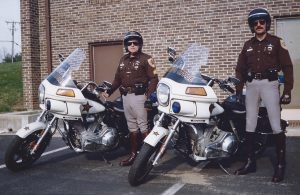
Now for the sheriff’s statement to the state police investigator.
The man who was telling me to keep my mouth shut, who refused to initiate an internal affairs investigation, who didn’t want to hear about witnesses who could corroborate my testimony, and who along with his cronies had been bad-mouthing me to the local press off the record.
How did I know they were making derogatory comments about me behind my back? Keep reading because later in this story, you will hear what a local newspaper editor said on that.
What did the sheriff tell the state police on the record? Poppa is considered reliable by Sheriff Isom. He knows of no motive for him to make up this testimony.
Do you think that the state police investigator was asked to testify about those statements at the second hearing on January 8, 1992? No, he wasn’t. Where was the honor in the state police, much less the attorney general’s office?
Any investigator knows that when you are conducting an investigation and have possible witnesses you interview all of them. It is your job to uncover the facts, all the facts, no matter where those facts may lead you. An investigation is a fact-finding mission and therefore investigators look for facts.
However, if you are not looking to uncover the truth then disregard the facts that would lead you in that direction. In this case, the State of Virginia had no interest whatsoever in getting to the truth.
They had no concern at all that William Carter may not have received a fair trial and could be innocent. Their mission was to make sure he remained in prison and would not win the writ of habeas corpus.
I was the obstacle in that endeavor that had to be stopped; discredited by any and all means.
It was no different than what I believe happened in William Carter’s trial in 1988.
The sheriff’s captain and commonwealth’s attorney had to protect the case and that meant that my statement to both of them about what Carters ex-wife told me could not be turned over to the defense, so they ignored what I told them.
In simple terms; let’s use all the evidence we have that makes him appear guilty, but we will not disclose any evidence that we have that may tend to prove he is innocent.
The state police investigators had checked the prison visitors log and telephone calls, trying to see if I had any prior contact with William Douglas Carter before I first testified. They found nothing.
I didn’t know William Douglas Carter from a hole in the wall. I never met him until I saw him at the first hearing. I had no idea if he was truly innocent or guilty, that was not my concern.
All I knew was that all the evidence was not presented at his trial and that is not what the criminal justice system is supposed to be about, and it is not what the Constitution of the United States is about.
Everyone deserves a fair trial in which all relevant evidence is presented to the jury. Everyone, it doesn’t make a difference who they are, or what the personal feelings may be on part of a prosecutor or investigator towards the defendant.
January 8, 1992, the day of the second hearing came pretty fast.
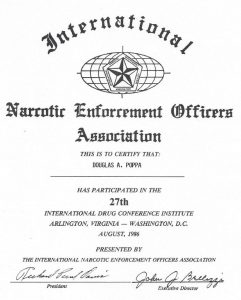 The holiday season came and went. There was no Merry Christmas and no Happy New Year for me that year.
The holiday season came and went. There was no Merry Christmas and no Happy New Year for me that year.
This was the day of reckoning I thought at the time. The outcome can be only one of two possible decisions by the court. Would the court believe me and corroborating witnesses, release William Carter from prison and award him a new trial or side with the state attorney general’s office, ruling against Carter?
After everything I had gone through up until this time I can tell you that my faith was not in the system, or I should say, at least the system, as it was run by Burch and Isom.
I was dragged out, burned out and tired. I was angry. I felt emotions that I never felt before and they were not good. It was like a bad dream that I couldn’t wake up from.
No matter what the decision would be I knew my career was going down the drain. The only thing left for me to do was get back on the stand, tell the truth again and hope for the best. A win for Carter I thought at the time, would be a win for my reputation and credibility.
Retired Circuit Court Judge, Arthur Sinclair was brought in to hear the case. The State was represented at the hearing by Virginia Assistant Attorney General, Robert Condon.
On January 8, 1992, Loudoun County Commonwealth’s Attorney, William Burch, Sheriff’s Department Captain, Vernon Beamer, Carole Carter, myself and a litany of other witnesses took the stand, including those witnesses that I told the state police could support my testimony, but were never interviewed by them.
Burch testified to the same story he had told the press, that all I told him was that Carole Carter had “suicidal tendencies.”
But even that ridiculous statement backfired on him.
When Burch was asked under oath if the defense could have used “suicidal tendencies” at Carter’s trial, Burch responded, “I suppose they could have.”
Beamer testified I never had a conversation with him about Carole Carter.
Carole Carter testified she never made the statement to me and never drove me to the estate.
However, Ed, Mary and Bill Harris, the ones that the state police never interviewed, corroborated my recollection of the events.
A reporter for the Leesburg Today newspaper who sat in on the hearing wrote in an article on January 10, 1992:
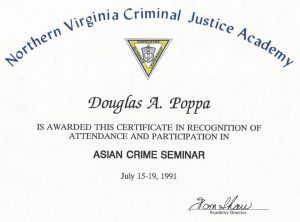 Poppa’s testimony was strongly supported by a former Sheriff’s Department lieutenant, William H. Harris, who flew in from Colorado to testify. Stating that Poppa called him after returning from touring Carter’s home and that they discussed whether Poppa should take the job. Harris testified that “Poppa was concerned about her mental stability and that she seemed to be totally possessed with hatred for her former husband. He told me that she said she would kill herself if she thought he could be blamed for it.” After the shooting, Harris said Poppa came to his office and pointed out that the victim was the woman who had wanted to hire him as a security guard. “I asked him if he had brought his information to the Criminal Investigation Division,” said Harris. “He went right down and saw Beamer and came back in a few minutes and said Beamer told him they had an airtight case, so forget it.”
Poppa’s testimony was strongly supported by a former Sheriff’s Department lieutenant, William H. Harris, who flew in from Colorado to testify. Stating that Poppa called him after returning from touring Carter’s home and that they discussed whether Poppa should take the job. Harris testified that “Poppa was concerned about her mental stability and that she seemed to be totally possessed with hatred for her former husband. He told me that she said she would kill herself if she thought he could be blamed for it.” After the shooting, Harris said Poppa came to his office and pointed out that the victim was the woman who had wanted to hire him as a security guard. “I asked him if he had brought his information to the Criminal Investigation Division,” said Harris. “He went right down and saw Beamer and came back in a few minutes and said Beamer told him they had an airtight case, so forget it.”
After hearing a day and a half of testimony Judge Sinclair stated he would review everything and give his decision in a few weeks.
During this waiting period the sheriff’s harassment, threats of demotion and firing against me ceased, while they waited for the decision to come down. I was told by an insider that once the judge came back and agreed that William Carter should remain in prison and did not deserve a new trial that the sheriff was going to fire me and that they were going to go after me for perjury charges.
Even that proved to me how deceitful these people were.
I first testified In November. After my testimony, they stated I had lied.
Not only the commonwealth’s attorney but the state police said that. The prudent thing to do to further justice should have been to prove who was lying before the second hearing in January.
But they couldn’t do that because they knew I wasn’t lying.
When I told the state police that there were other people that could corroborate my testimony, they knew as the sheriff knew that they had a really big problem at that point.
They were accusing me of lying, but now there were three others in the picture.
A former cop and two federal officers.
Were they going to accuse them of lying also?
A judicial bomb was about to be dropped on Loudoun County law enforcement and its criminal justice system.
On February 6, 1992, Judge Arthur Sinclair returned to court and read his decision. Excerpts as follows:
“There is a presumption of truthfulness which prohibits supportive evidence unless and until some shadow of a doubt is cast upon the testimony by the opponent or by the nature of the testimony itself.” The “shadow of a doubt” is cast upon Investigator Poppa’s testimony by the former Mrs. Carter, by Captain Beamer of the sheriff’s department and by Commonwealth’s Attorney Burch if not by others.
The issues in this case are simple, i.e., did the former Mrs. Carter make the statement concerning shooting herself to then Deputy Sheriff Poppa, was the statement, if true, exculpatory and did Poppa apprise members of the sheriff’s department and the prosecutor prior to trial?
The resolution of these issues places on this trial judge an awesome responsibility he would prefer to leave unanswered. It is my opinion that the testimony of Investigator Poppa is in all respects credible.
His testimony has the support of the equally credible testimony of the witness Harris who stated that Poppa came to him with his story of what then Mrs. Carter told him and asked for advice.
The petitioner has proven by a preponderance of the evidence that material evidence of an exculpatory nature was not revealed to the defense upon request at the trial which resulted in his conviction and present incarceration.
He is entitled to have another jury at another trial consider that evidence.
Once Judge Sinclair’s decision came down, in all my years of law enforcement, I never heard what was told to the media by the Senior Assistant Attorney General for the State of Virginia, John Russell and his Assistant Attorney General, Robert Condon who represented the State at the hearing, and lost.
Robert Condon told the press, “It wasn’t to our benefit to prove Poppa’s allegations.”
 John Russell stated, “We were gathering facts to dispute Poppa’s allegations, not support them.”
John Russell stated, “We were gathering facts to dispute Poppa’s allegations, not support them.”
It may not have been to their benefit to find out who was telling the truth, but it certainly would have been to the benefit of an incarcerated man who did not receive a fair trial.
And what about the fuckin hell I went through. They thought that it was okay to destroy a cop’s reputation just so they could “win” at the hearing. What happened to the truth, did that even matter?
As far as John Russell, the Senior Assistant Attorney General in charge of the criminal division for the Virginia State Attorney General’s Office, he would come crawling out of the woodwork again, and this time he would be the one whose credibility would be questioned in court. Later in this story you will find out why.
In a memo dated November 25, 1991, five days after I testified in the first hearing, Virginia Assistant Attorney General, Robert Condon requested that the Virginia State Police assist him in investigating the merits of my allegations.
Condon specifically told the state police, “With the express understanding that this request for an investigation is solely to assist our office in defending the habeas-corpus proceeding and is not an investigation of either the Office of the Commonwealth’s Attorney or the Sheriff’s Department.”
I got ahold of this memo many years down the road. When I read it I was pissed off and angry. Why? Because there was no doubt that the commonwealth’s attorney and the sheriff knew at the time about the purpose of the investigation requested by the state attorney general’s office.
They knew that they would not be targets of the investigation, which opened the door for them to say whatever they wanted to say about me to support the State’s case, with impunity.
Burch knew he would never be asked to take a polygraph and so did Beamer. Just as Robert Condon said in the memo, they were not investigating the commonwealth attorney’s office or the sheriff’s office.
In other words, they were not investigating Burch, Isom or Beamer.
Just like Russell and Condon had stated to the media, it wasn’t to their benefit to prove I was telling the truth. Even to this day, that is the most horrendous statement I have ever heard from anyone, before or after, who has been associated with the criminal justice system.
Looking back, I might as well have been hitting my head against a brick wall at the time.
In the past, the state police had conducted investigations of the sheriff’s department and other county offices and people had been asked to submit to a polygraph examination, but not this time, and it was pretty evident why.
Judge Arthur Sinclair brought back my faith in the system. He was an honest judge. And that goes for Loudoun County Circuit Court Judge, James Chamblin also.
Everything that had been said about my credibility up until that time, all the attacks in the paper by Burch and his deputy, the off the record attacks by the sheriff’s office to the press, in the end, did them no good.
After Sinclair’s decision came down I was outside the Loudoun County Courthouse being interviewed by the local media. While I was talking, sheriff’s office Investigator, Jay Merchant, a close friend of the sheriff, ran up yelling, “I’m going to get you, I’m going to get you.” His remarks were captured on the audio portion of my interview.
He was pulled back by another cop and left the area.
I almost wished he had tried something, I told myself at the time. He was just another jackass just like the rest of them, I thought.
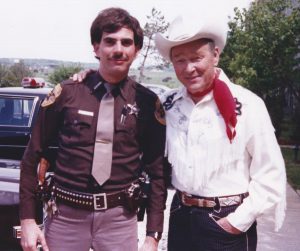
Birds of a feather flock together.
Witnesses who heard that told me at the time that I should go after him for making threats. If I had ten dollars for every time somebody had threatened me throughout my law enforcement career I probably would have had plenty of money in the bank.
After the hearing, Steve Twomey, a columnist with the Washington Post wrote an article and summed it up pretty good.
….Ten days ago, after hearing from Carole Carter and Beamer and Burch and Poppa, retired Circuit Court Judge Arthur Sinclair, who was appointed to handle the case, freed Bill Carter from prison and ordered a new trial. Sinclair said law enforcement had failed to disclose key evidence at Carter’s trial. The evidence was Poppa’s. He was, said the judge, “in all respects credible.”
After his conviction was overturned by Judge Sinclair and he was granted a new trial, William Douglas Carter told the Leesburg Today newspaper, “I’m extremely grateful to an honest cop.”
“When he came forward he knew Burch hadn’t done his job. He was a sitting duck. Now he’s been crucified.”
“The recent press coverage surrounding this case has focused, and rightfully so, on Poppa’s testimony. But we have other evidence of misconduct and criminal activity by the sheriff’s department and Burch surrounding this case. I’m going to do everything in my power to have these people exposed.”
Carter’s attorney John S. Edwards told the Leesburg Today newspaper, “We think the judge was absolutely correct in his decision.”
“I’m especially pleased he found Investigator Poppa’s testimony credible and supported by the witnesses.”
I received a letter from a local businessman who wrote, “I’m damned pleased that there are indeed some honest principled officers of the law out on the streets doing what they were sworn to. I would trust a good cop with my life. There are all too few good cops but in my estimation, you certainly qualify as a good one.”
One of the Loudoun County Board of Supervisors wrote in a letter: Like many other citizens in our community, I have followed your story with great interest. I believe that every public servant has an obligation to live by a standard of conduct that precludes even the perception that a conflict of interest exists between the public interest and private interests. I believe you have upheld this code of conduct to the highest standards, in spite of the great personal cost. It is refreshing to see people who reject sycophantic behavior and display some spine. This fact has not gone unnoticed in our community.
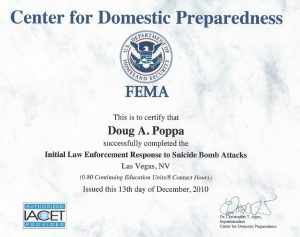 My personal belief, that you are a victim of a “kill the messenger” reaction on the part of certain officials in the county in order to protect themselves, is one that is shared by many of my friends and neighbors, including those on the Board of Supervisors. It is unfortunate and frustrating that we are unable to reach this issue and provide you with an appropriate level of remediation through our legislative authorities and responsibilities. However, should the occasion arise where I can assist you, you will have my full support.
My personal belief, that you are a victim of a “kill the messenger” reaction on the part of certain officials in the county in order to protect themselves, is one that is shared by many of my friends and neighbors, including those on the Board of Supervisors. It is unfortunate and frustrating that we are unable to reach this issue and provide you with an appropriate level of remediation through our legislative authorities and responsibilities. However, should the occasion arise where I can assist you, you will have my full support.
Over the years I had received many letters from citizens that I came into contact with during the performance of my job, thanking me for something that I had done, even though what I did was nothing more than what I swore an oath to do. I cherished all of those letters. When someone takes the time to sit down and write a thank you letter, to me, it really meant something.
After the second hearing, local news media coverage, both in print and on television went out of control. The coverage of my story went national after the show Inside Edition came out and interviewed me.
Because of that, I heard from cops all across the country that had gone through similar circumstances. It was actually pretty amazing how often occurrences like mine had happened in the law enforcement community.
It was pretty sad.
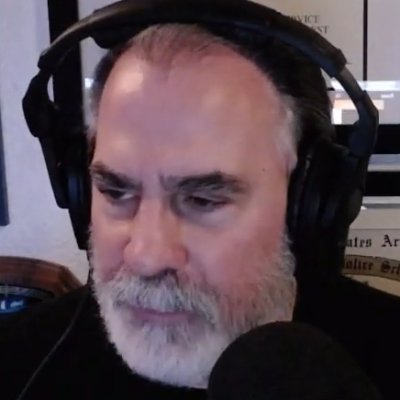
Doug authored over 135 articles on the October 1, 2017 Las Vegas Massacre, more than any other single journalist in the country. He investigates stories on corruption, law enforcement and crime. Doug is a US Army Military Police Veteran, former police officer, deputy sheriff and criminal investigator. Doug spent 20 years in the hotel/casino industry as an investigator and then as Director of Security and Surveillance. He also spent a short time with the US Dept. of Homeland Security, Transportation Security Administration. In 1986 Doug was awarded Criminal Investigator of the Year by the Loudoun County Sheriff’s Office in Virginia for his undercover work in narcotics enforcement. In 1992 and 1993 Doug testified in court that a sheriff’s office official and the county prosecutor withheld exculpatory evidence during the 1988 trial of a man accused of the attempted murder of his wife. Doug’s testimony led to a judge’s decision to order the release of the man from prison in 1992 and awarded him a new trial, in which he was later acquitted. As a result of Doug breaking the police “blue wall of silence,” he was fired by the county sheriff. His story was featured on Inside Edition, Current Affair and CBS News’ “Street Stories with Ed Bradley”. In 1992 after losing his job, at the request of the Federal Bureau of Investigation, Doug infiltrated a group of men who were plotting the kidnapping of a Dupont fortune heir and his wife. Doug has been a guest on national television and radio programs speaking on the stories he now writes as an investigative journalist. Catch Doug’s Podcast: @dougpoppa1

